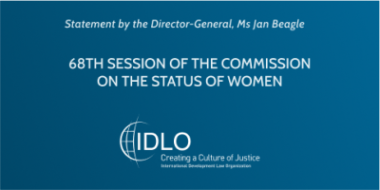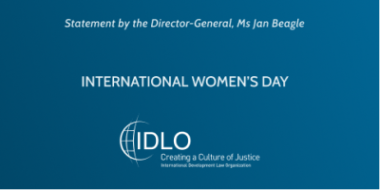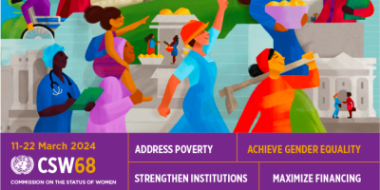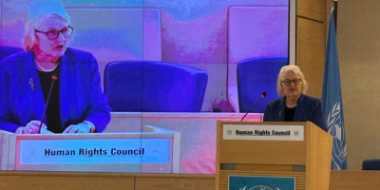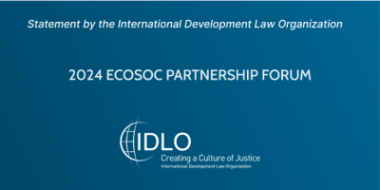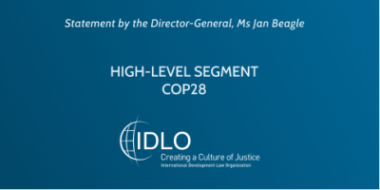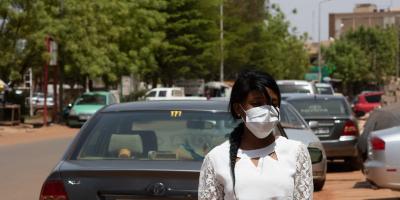
By Ilaria Bottigliero, Rea Abada Chiongson, Marina Elefante, Nupur Prakash and Isabel Micaela Santagostino Recavarren
During this year’s 16 Days of Activism against Gender-Based Violence, the World Bank’s Women, Business and the Law team and the International Development Law Organization (IDLO) are raising awareness about the power of the law to respond to the violence against women (VAW) pandemic, which continues to pervade many women’s realities. VAW can take many forms – from sexual harassment to sexual assault; from child marriage to female genital mutilation; from forced sterilizations to trafficking in women and girls. Intimate partner violence, however, is still the most common form of VAW, with about 35% of women globally having experienced physical and/or sexual violence in their lifetime by an intimate partner. Every day, 137 women across the world are murdered by a member of their own family, making ‘the home the most likely place for a woman to be killed’.
VAW is a violation of a woman’s rights to life, health, liberty and security, among others. Domestic violence, in particular, has a devastating impact on women’s physical and mental health, leading to repercussions on their performance in the workforce and on firm productivity. With high costs in terms of health care, legal, housing and social services expenditures, domestic violence also affects countries’ economy. The economic cost of domestic violence has been estimated to correspond to about $4.4 trillion, or 5.2%, of global GDP.
The spread of the COVID-19 pandemic has greatly exacerbated intimate partner violence. Movement restrictions combined with economic and social stress have contributed to a rise in cases of domestic violence worldwide and the severity of the injuries reported. While an increase in calls to helplines and reports to the police was observed, women survivors of violence faced additional barriers to accessing services when stringent anti-COVID measures were put in place.
A recent report on Justice for Women Amidst COVID-19 found that restrictions imposed to curb the COVID-19 pandemic have curtailed the ability to respond to VAW cases and hold perpetrators accountable. Law enforcement and health professionals – who are generally categorized as first responders - are overburdened with the demands posed by the pandemic, leading to a de-prioritization of VAW complaints and support services. Court systems across countries are struggling to manage proceedings, with significant delays in issuing restraining orders and adjudicating divorce and child custody proceedings. Of particular concern are judicial systems that do not have the infrastructure to utilize telecommunication tools and operate remotely, consequentially delaying matters that could lead to severe harm for VAW survivors. For many women, this inability to access justice is further compounded by many layers of disadvantages – such as poverty, ethnicity, disability and migrant status.
Women, Business and the Law and VAW
Over time, Women, Business and the Law, which measures laws and regulations that restrict women’s economic inclusion, has linked laws protecting women from violence with economic outcomes. For example, women are found more likely to own firms in economies where workplace sexual harassment laws exist. The enforcement of legislation aimed at protecting women from domestic violence and sexual harassment is associated with a reduction in gender inequality and discrimination in the labor market. Despite this important link, 45 economies still do not have legislation on domestic violence. Moreover, out of the 155 economies that do have these provisions in place, only 101 strictly adhere to international good practices by defining domestic violence as physical, psychological, sexual and economic abuse.
Since the pandemic started, Women, Business and the Law has been collecting new data on the measures governments are implementing to address the unique challenges women face during this time. Preliminary findings indicate that several countries have implemented a variety of measures to give survivors of all forms of violence access to protection orders, the court system and services such as medical and psychological support, legal aid, hotlines, shelters and housing, and financial assistance. The data collected by Women, Business and the Law show that a dozen of economies automatically extended protection orders as a direct response to the COVID-19 health crisis. A slightly higher number of economies enabled remote access to courts during the pandemic, and, where courts remained open, many continued to prioritize or hear “urgent cases” only, such as domestic violence and child custody cases, among others. Most of the economies analyzed adopted measures to enable or enhance services for survivors of violence. Hotlines were the most popular service, followed by psychological assistance, shelters, legal aid, dedicated police resources, livelihood and healthcare services.
IDLO and innovating justice responses for survivors of violence
As a global intergovernmental organization focused on the rule of law, IDLO sees the rule of law as a powerful tool to end VAW. From building legal frameworks that prevent and protect from VAW to responding to the justice needs of survivors, IDLO has been adapting and innovating justice solutions to address VAW, especially in times of COVID-19. For example, as a result of this work, Mongolia is developing handbooks on legal advice and assistance for survivors of domestic violence to improve the capacity of legal aid providers to process the increasing number of requests during the pandemic and holding a series of live stream sessions to provide advice to survivors of domestic violence. A working group with representatives of the judiciary, prosecutors, police and correctional facilities was convened to discuss challenges resulting from the pandemic and measures to protect citizens, including the most vulnerable. Finally, a public legal awareness campaign on VAW and COVID-19 in print, social media, radio and TV outlets was launched.
Working with IDLO, Tunisia adopted the country’s first national procedure manual for women’s shelters, which outlines uniform guidelines for shelters in the country as they deliver legal services to women and children survivors of violence, as well as established a virtual platform for online legal aid provision to women facing violence during COVID-19. In Afghanistan, the government, with IDLO, supports women protection centers or shelters, by addressing overcrowding and other challenges posed by the pandemic. Using the database IDLO helped developed for the Elimination of VAW units (special prosecution units) to track cases of VAW, the country managed to identify women in custody eligible for release to prevent spread of the virus and ensure their safety.
The surge in VAW cases under conditions of lockdown poses major challenges for survivors. More measures are needed to respond to this shadow pandemic. Data, legal and justice innovations from The World Bank and IDLO can help governments in their efforts to support survivors and catalyze more effective and fair evidence-based legal and justice responses to VAW, including during a pandemic.
This piece also appeared on World Bank Blogs.
*Ilaria Bottigliero is the IDLO Director for Policy, Research and Learning, Rea Abada Chiongson is the IDLO Senior Legal Advisor on Gender, and Nupur Prakash is the IDLO Gender and Law Analyst.
*Marina Elefante is a Legal Analyst and Isabel Micaela Santagostino Recavarren is a Private Sector Development Specialist with the World Bank’s Women, Business and the Law project.
Photo credit: World Bank_Mali_Ousmane-Traore


